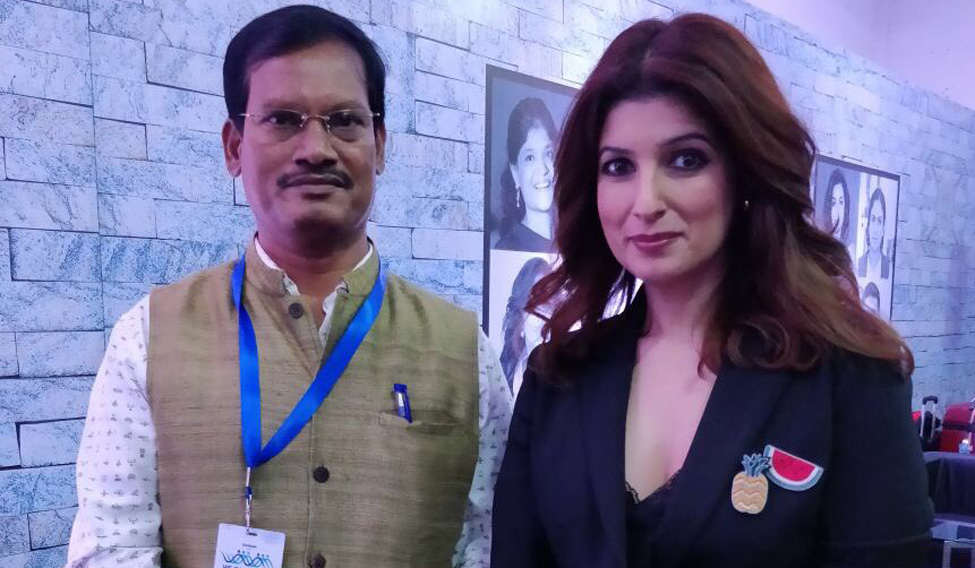In India, menstruation continues to be a taboo topic, something that even most women shy away from openly discussing. In an effort to spread further awareness about the stigma and discrimination women face during their period Twinkle Khanna joined Burkha Dutt at the ‘We the Women’ summit at Mumbai’s Mehboob studio on Saturday.
The session which was titled, Let’s talk about it. Period also included Arunachalam Muruganantham, the man who wore sanitary napkins for several weeks to design a low-cost and affordable pad for women in rural parts of the country.
While candidly speaking about how a sanitary napkin is treated as a luxury item in India due to which nearly 90 per cent of Indian women are unable to afford it, Twinkle Khanna said, “If a male politician put a pad between his legs with blood dripping all day, I am sure pads would be freely available in public institutions.”
Khanna further spoke about how women are very embarrassed to even talk about menstruation. “It’s because of our conditioning, and this is not just in India. If you go back to history, it was believed menstruation makes dogs rabid and crops harvesting fails. Then there was a professor who came up with ‘menotoxin’ or menstrual toxin. We are always told it is unhygienic and dirty and how women can’t go to temples while menstruating and that we need to be segregated for those seven days,” she said.
While she said she did not face any stigma while growing up due to the monthly menstrual cycle, Khanna recalled an incident from her boarding school days. “I had two friends who didn’t want to go back home during their holidays because they were kept aside from the rest of their family whenever they got their period. Their food used to be kept outside on a plate and they were treated like stray animals. One woman I knew got divorced because, while she was menstruating, she sat through Guari Puja and didn’t inform her mother-in-law and because of that they threw her out of the house. These incidents stayed with me through all these years,” said Twinkle.
During this session, Muruganantham openly spoke about how he saw his wife using old rag cloths during her period as she and the other women in his family could not afford to purchase pads on a monthly basis. “I remember asking my wife why she just couldn’t go to the chemist store and buy pads instead of using filthy rags. She replied by slapping me and informed if the women in our household had to buy pads, we wouldn’t be able to afford to buy milk,” he said.
That inspired him to take up the cause of making affordable sanitary pads for rural women. Muruganantham narrated how he had to cycle 14 km to find the nearest drugstore in his village and was made to pay six rupees for each sanitary pad. “The chemist had wrapped the sanitary pads in a newspaper and gave it to me as if it was an illegally smuggled good. When I went home, that was the first time in my life that I touched a pad and I observed that it was basically cotton wrapped in plastic,” he said.
That is when his long journey began towards making an affordable pad. While women refused to volunteer, he was left with no option but to wear a sanitary napkin every day for three weeks. “The next challenge was, I had decided to wear the sanitary napkin but where do I get a uterus from? So I made an artificial uterus from a rubber bladder and I filled it with animal blood and tied it to one side of my hip. A tube connected the rubber bladder and the sanitary napkin and while walking, I would give the bladder a slight squeeze for the blood to start flowing to the sanitary napkin,” he explained.
“The moment I experienced the feeling of wearing a sanitary napkin with goat blood, I lost my confidence. Second, I lost my independence. Every five minutes I had to check my dhoti for blood stains and people suspected I had sexual diseases or that I was a vampire,” he added. During this phase, his wife got so upset, that she sent him a divorce notice and the couple had separated for a long time. Muruganantham comes from a humble background and was forced to drop out of school at the tender age of 13 after his father met with an accident and passed away.
After four and a half years of trying to make a low-cost sanitary pad, he finally succeeded in creating a machine for the production of affordable pads. Following that, he made 250 machines in 18 months and now runs Jayashree Industries with units all over India. Speaking at the ‘We the Women’ summit he further said, “India cannot become a superpower if our wives and daughters continue to be pushed away to the back of their house during their periods.”






